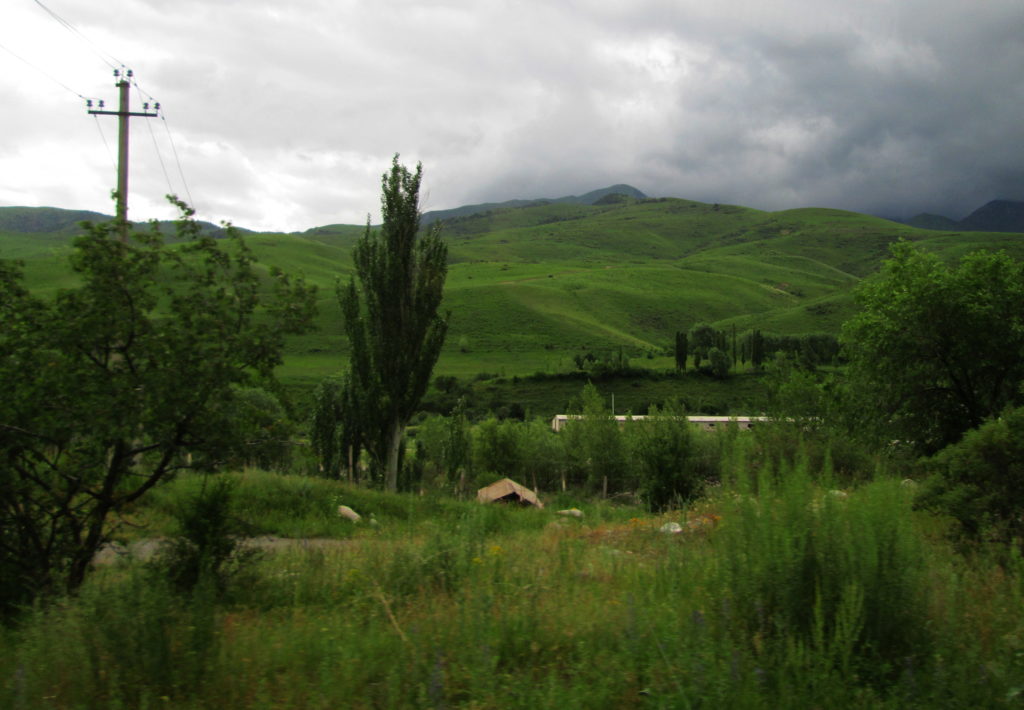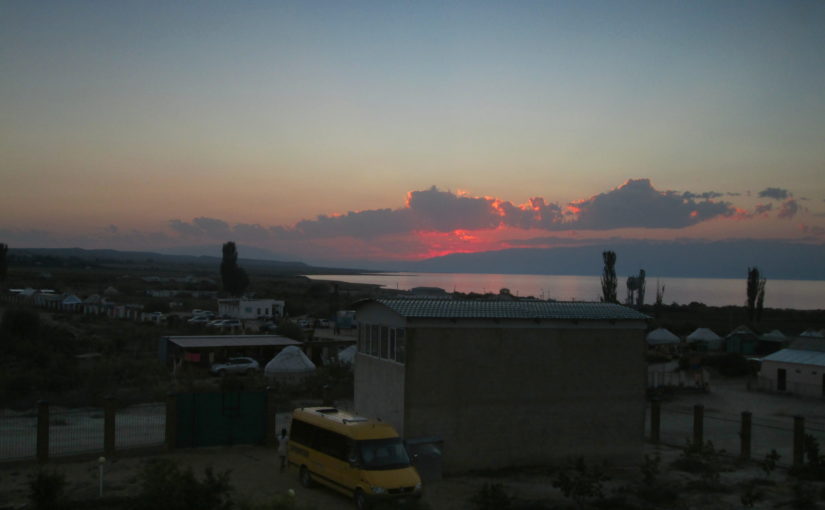Kyrgyzstan is one of only a few countries in which bride kidnapping is practiced. In Russian, the practice is called ‘кража невести’ (krazha nevesti), which literally means ‘theft of the bride.’ The following are summaries of five semi-casual conversations that I conducted with Kyrgyz natives on the topic of bride kidnapping.
I had heard about and read up on bride kidnapping before coming to Kyrgyzstan, but had been avoiding the topic because it made me uncomfortable. However, after hearing some of the other American students in my program discuss the topic, my interest was piqued and I decided to do my own research and converse with some native Kyrgyz people on the topic. The following is the result of my conversations, along with a few casual conversations with other college-age Kyrgyz young people. It completely changed my understanding of bride kidnapping to hear personal accounts of the practice from Kyrgyz natives. It was difficult to converse face-to-face in Russian, since I am more confident in my reading skills than in my conversation skills, but because of that I was able to hear and understand these narratives firsthand instead of through an article that someone else had written.
~
If you look up ‘Kyrgyzstan’ on Google or Youtube, chances are that one of the first results will be a video that went viral a few years ago (now it has 6.8 million views) depicting groups of men grabbing women off of the streets and forcing them into cars. That action is part of the practice of bride kidnapping, a practice with a very long history in Kyrgyzstan but which has been making news in the country in recent years.
The explanation of bride kidnapping is that it began as a way for lovers to get married in a society where going against one’s parents’ wishes was forbidden. The woman and the man both agreed to the action, and the ‘kidnapping’ was only necessary because the woman’s parents would not allow the marriage otherwise. However, since the Soviet era, and especially afterwards, the practice has become horribly twisted. It is common now for a woman to be kidnapped without her consent, and sometimes she has never even met the man who is kidnapping her. But bride kidnapping in Kyrgyzstan, or “кража невести” (krazha nevesti – literally “theft of the bride”) is more complicated than just kidnapping. The woman is grabbed off the streets by a group of the kidnapper’s friends and taken to the kidnapper’s house. There, she is locked in a room with the kidnapper’s female relatives who try to put a white scarf on her head and coerce her to agree to the marriage. If the white scarf is placed on her head, then they consider that she has agreed to the marriage and soon after the couple is publicly and officially married. It is not a completely barbaric practice. However, some bride kidnappings do involve rape and some even end with the kidnapped woman ending her own life.

“She was stolen”
I told two female Kyrgyz acquaintances about my interest in learning more about bride kidnapping, which lead to two interesting conversations. Both wholeheartedly condemned the practice. The first, who was married, pointed out that the kidnapped woman has no choice and is often in her late teens. The woman is without any university education, leaving her completely dependent on her new husband afterward. She said that in the villages there is an enormous stigma after a woman has been kidnapped, so that she will be shamed for the rest of her life if she does not agree to marry the man. She said that regardless of how the girl cries, screams, and fights, if the mother of the kidnapper can place a white scarf on her head, then she is considered married, and once she spends one night in her kidnapper’s house, she will not be considered for marriage by any other man anymore.
Both acquaintances told me about a recent event that was all over the news a few months ago in Kyrgyzstan, in which a 20-year-old woman was killed by her kidnapper. She was a university student in Bishkek, but her family lived in a village. She had been kidnapped by this man before but had managed to escape. When she went to visit her family again for a holiday, he kidnapped her again. Her parents called the police and the police intervened and they were both taken to the police station. In the police station, he stabbed her to death with a knife. And he didn’t just kill her, he also defaced her body, carving up her chest with his initial and the initial of her fiancé, as well as a large cross. How did he get the knife? How was he able to kill her and carve her up in the police station? What kept the police from arriving in time to save her? And no investigation has been made into how this was possible.
Apparently, even when parents call the police asking them to rescue their daughter, the police either ignore the request, telling the families to solve it among themselves, or retrieve the girl but let off the kidnapper. The police in Kyrgyzstan are easily bribed. Often, the father has to gather a group of other male relatives and friends and go to the kidnapper’s house and forcefully take his daughter back; if he goes alone, the kidnappers friends will stop him from taking back his daughter. These happenings show that the government of Kyrgyzstan is not taking the problem of bride kidnapping seriously.
These two conversations were easy because the married woman was fluent in English and the other woman had studied in America, although her English was rusty. If there was something that I did not understand, they could explain it to me with hand motions, different vocabulary, or in English. In order to make sure that I understood my language partner correctly, I would repeat back to her in my own words what she told me, which also helped me to remember the material and practice my own Russian communication skills. I was surprised that she spoke about bride kidnapping so openly that she was willing to repeat herself and explain herself. At first I was apprehensive about talking about such a touchy subject, but it seems that in Kyrgyzstan it is a less controversial topic than it would be in the West.

“My sister was stolen”
One night several of us students, together with some of our Kyrgyz friends, watched the soviet comedy “Кавказская пленница“ (‘Kavkazskaya Plennitsa’), ‘Kidnapping, Caucasian style’ (literally, ‘The Caucasian Captive’), which centers around a plot to force a young woman into marriage by kidnapping her and holding her hostage until she consents to the marriage. Despite the serious subject matter, it is a very lighthearted and funny comedy and I recommend watching it (the official version with English subtitles is available on Youtube for free.
After the movie, one of the Kyrgyz young women mentioned to the girl next to her that her sister had been kidnapped (note: the Russian word for ‘female cousin’ is ‘двоюродная сестра ’ (dvoyurodnaya sestra), and the Russian word for sister is ‘сестра’ (sestra); throughout the conversation she referred to the kidnapped bride as her ‘sister,’ but, given context clues, I assume that she used ‘sister’ as shorthand for ‘cousin’). She was 20 years old when she was kidnapped. The man who kidnapped her had only met her twice before. He kidnapped her and brought her back to his parent’s house, where his female relatives pressured the kidnapped girl into consenting to marry her kidnapper.
At this point, she paused to explain to me how this could happen. If a kidnapped woman leaves the house of her kidnapper after she has been kidnapped, it is taboo and she cannot get married in the future. That was how it was in the past; now, it is possible for the police or the woman’s family to rescue her and she can return to her life, but in the past, if a woman was kidnapped, she either married her kidnapper or never married. Faced with the possibility of never marrying, her sister caved in to the pressure and consented to marry her kidnapper. It’s been five years and they have two children. “Are they happy?” I asked. “Наверное (navernoye – probably),” she replied. “I have not asked her.”
She told me that when she learned that her sister had been kidnapped, she was furious (she used the Russian word ‘зла’, which means ‘angry’ but also ‘evil’ and ‘wicked’). When I asked her what she would do if she were kidnapped, she said that she would refuse to marry and leave, definitely. She is not afraid of the taboo. When I asked her about the capability of the police, she admitted that they often do not help, accepting bribes and trying to make the families solve it between themselves. If the woman’s family had enough men, they could go and take her back, but if they did not, and the police did not help, then there was not really anything that they could do. She left it at that.
This second conversation was both easier and harder than the first. It was harder because this woman more quickly and did not leave me as much time to ask questions. However, when I realized that I was not completely sure that I understood her narrative, I was able to ask her a second time and she patiently explained her story to me another time and this time I made sure to ask all the clarifying questions that I needed to.
After conducting the first three conversations and settling my thoughts on the uneasy subject matter, I considered how the conversations had helped my language skills. I was surprised at how little specialized vocabulary was needed to talk about the subject. For example, I do not know the Russian word for ‘to kidnap,’ but that did not matter because the Kyrgyz use the word ‘to steal’ when talking about bride kidnapping, and I had learned that word a while ago. Speaking about bride kidnapping allowed me to use words that I already knew in contexts that I would never have imagined using them before.

“My mother was stolen”
“This was during the time of the Soviet Union. My father served in the military near Moscow for two years. Soon after his returned home, he went on vacation with his friends to lake Issyk-Kyl. There, he saw a girl who caught his eye and he asked his friends about her. ‘She’s a local girl,’ they answered, ‘She’s good.’ And the next day he told his parents his plans and then kidnapped her. Soon after, they married. And now they are very happy. They had four children and I am the youngest. They love each other.”
That was the story that a 28-year-old Kyrgyz male acquaintance of mine told me when I asked him for his opinion on bride kidnapping. Overall, his stance seemed to be that bride kidnapping is not the big deal that people make it out to be. He said that the practice is downright stupid: why kidnap someone that you’ve just met and who doesn’t even like you? (Or he could have been saying that it’s ‘rude’ or ‘offensive’; the words for stupid (глупый – glupii) and rude (грубый – grubii) are very similar to me.) He also cleared up another question for me: when a man kidnaps a woman, he can call his friends to kidnap her for him, or he can kidnap her himself; both variations are practiced.
However, he approved of the practice when the two loved each other and mutually consented to the kidnapping. In Kyrgyzstan, honoring one’s parents is very important, and it is forbidden to go against one’s parents’ wishes regarding marriage. Therefore, if a woman’s parents do not consent to her marriage to a man, then the only way for them to be married is for the man to ‘kidnap’ the woman. He framed it as ‘going against the system,’ which is something that we really like in America. Interestingly, none of the younger women that I spoke with brought up this situation, focusing only on the incorrect practice of bride kidnapping as it occurs today and not the original tradition. A 22-year-old man that I spoke with only told me about this original tradition, and then admitted that the tradition became twisted, but then denied that it is a problem now. It doesn’t happen anymore, he said.
When I asked him (the 28-year-old) about whether or not bride kidnapping is ‘right,’ he replied that, maybe it was right in the past, but it is no longer right. This is because it is forbidden now; therefore it is wrong. In the past, people were more religious and followed the traditional culture more closely. Women did not have a say and were under the control of the men in their lives, and bride kidnapping was an extension of that. Also, he pointed out that, traditionally, bride kidnapping was only practiced in those situations when the bride’s parents disapproved of the marriage, and never happened between people who did not know each other or did not both consent. Kidnapping a bride without her consent is stupid, he explained, because you am going to live with her for the rest of your life, so why would you kidnap someone that did not love you or even know you? (Yes, sometimes the conversation became interesting as we used “I” and “you” to refer to a stand-in theoretical kidnapper and kidnapped person.)
In response to the question of whether or not bride kidnapping is a big problem in Kyrgyzstan, he said that it is not. Becoming a bit impassioned, he said that the western media loves to find something strange and make a big deal about it, painting Kyrgyzstan in a bad light just to get a good story. And bride kidnapping does make a very interesting story. But it is not as though every bride in Kyrgyzstan is kidnapped against her consent (as we talked a wedding cortege passed by and he pointed to the bride and said, “Look, do you think that she was kidnapped? No!”). There are much bigger problems in Kyrgyzstan that deserve more attention, he said. Regarding the police, he responded that often they can be bribed by the kidnapper’s parents (the police bribery problem is one that extends beyond bride kidnapping) and that it is difficult for the police to know how to solve the situation. They do not know if the bride consented or not, nor do they know if the man and woman know each other and can solve it between themselves without police intervention.
The previous conversations were all the result of a first, spontaneous conversation, which I believe deserves it’s own blog post, which I will post immediately after this one. During that initial conversation, I made sure to remember all of the words which I was not sure of and look them up. This helped me to create a list of words related to bride kidnapping so that the next conversations could be conducted more easily. Above all, that first conversation showed me that cultural problems in a foreign country are not something that is foreign to the people living there. It seemed to me that bride kidnapping was something that happened to nameless, faceless, Kyrgyz women, something that I could blissfully ignore as a foreigner. But once that bride was given a name and a face and I looked inter her eyes, I realized that there is no ‘us’ and ‘them,’ no progressive Americans and backwards Kyrgyz, only people.
